Blog September 5, 2013
Hip Deep Lebanon 1 Special Feature: Zaki Nassif and Sabah
This special feature is a supplement to the Afropop Worldwide program, “Lebanon 1: Fairuz, A Woman for All Seasons.” The feature introduces two important contemporaries of Fairuz and the Rahbani brothers, namely composer Zaki Nassif and legendary singer Sabah. The images below are of Zaki Nassif’s nephew, Nabil Nassif, and of the Zaki Nassif archive at the American University of Beirut. This archive is overseen by Giselle Hebbo, seen here displaying some of the archive contents. The quotes come from Nabil Nassif, speaking about his uncle.
[soundcloud url="http://api.soundcloud.com/tracks/108871355" params="" width=" 100%" height="55" iframe="true" /]
[caption id="attachment_13334" align="aligncenter" width="604"]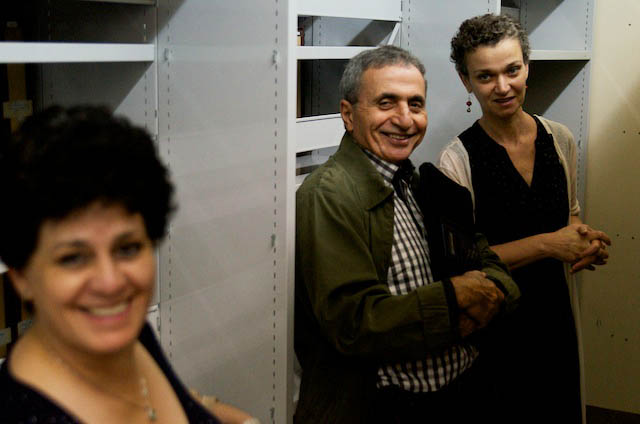 Giselle Hebbo, Nabil Nassif, another archivist[/caption]
“Zaki Nassif, the composer, was one of six children, 2 sisters and 4 brothers, and he was the youngest. He was born in 1916 in Mashghara, located in southern Bakaa Valley close to the south region of Lebanon. At the time, the Turks controlled the country, though they were being ousted by the British and the French during the First World War. Mashghara happens to be in the Bakaa but it’s close to Mount Lebanon. The governor of Mashghara was actually in Damascus, not Beirut. But after the War, when the British and the French occupied the area, the French took the mandate over Lebanon and Syria, and the created the Republic of Lebanon, with the borders we have now, and Mashghara became part of Lebanon, not Damascus.”
[caption id="attachment_13335" align="aligncenter" width="600"]
Giselle Hebbo, Nabil Nassif, another archivist[/caption]
“Zaki Nassif, the composer, was one of six children, 2 sisters and 4 brothers, and he was the youngest. He was born in 1916 in Mashghara, located in southern Bakaa Valley close to the south region of Lebanon. At the time, the Turks controlled the country, though they were being ousted by the British and the French during the First World War. Mashghara happens to be in the Bakaa but it’s close to Mount Lebanon. The governor of Mashghara was actually in Damascus, not Beirut. But after the War, when the British and the French occupied the area, the French took the mandate over Lebanon and Syria, and the created the Republic of Lebanon, with the borders we have now, and Mashghara became part of Lebanon, not Damascus.”
[caption id="attachment_13335" align="aligncenter" width="600"]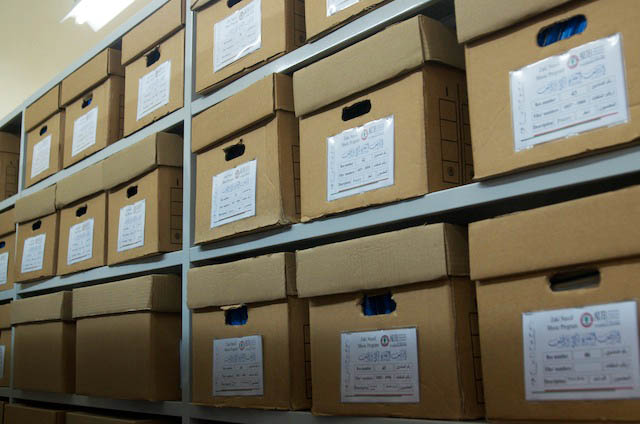 Boxes of Zaki Nassif artifacts[/caption]
“Shaki Nassif, the father of Zaki, had five brothers and they nearly all immigrated—four to the US. Two stayed in Lebanon, and all the others left. When I went to Harvard in 1970 to get my PhD there, my late father gave me the address of one of his cousins who was living in Worcester, Massachusetts, and I called him and he came and took me to Worcester, where there was a whole block of houses of people who essentially came from Mashghara. They came on ships, they used to go to Marseilles, France, and then take another ship. But they wanted to get out, because it was very hard. And this kind of sadness reflected on Zaki and his mother, and he said in some interviews that he was very much influenced by his mother’s singing. She had a very good voice, but she was singing sad songs, and she was crying, and he used to cry with her.”
[caption id="attachment_13336" align="aligncenter" width="602"]
Boxes of Zaki Nassif artifacts[/caption]
“Shaki Nassif, the father of Zaki, had five brothers and they nearly all immigrated—four to the US. Two stayed in Lebanon, and all the others left. When I went to Harvard in 1970 to get my PhD there, my late father gave me the address of one of his cousins who was living in Worcester, Massachusetts, and I called him and he came and took me to Worcester, where there was a whole block of houses of people who essentially came from Mashghara. They came on ships, they used to go to Marseilles, France, and then take another ship. But they wanted to get out, because it was very hard. And this kind of sadness reflected on Zaki and his mother, and he said in some interviews that he was very much influenced by his mother’s singing. She had a very good voice, but she was singing sad songs, and she was crying, and he used to cry with her.”
[caption id="attachment_13336" align="aligncenter" width="602"]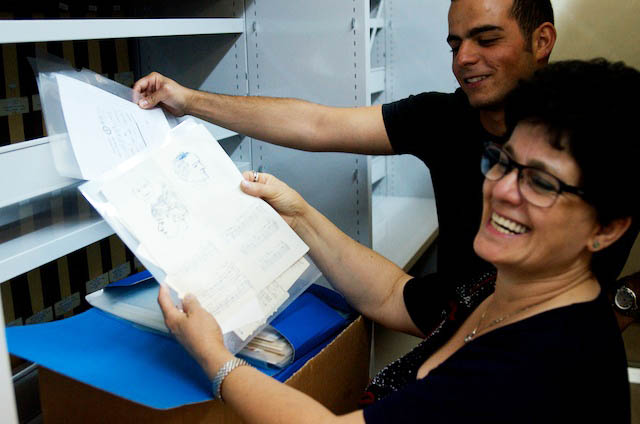 Giselle Hebbo, Michel Moufawad in the archive[/caption]
[caption id="attachment_13332" align="aligncenter" width="601"]
Giselle Hebbo, Michel Moufawad in the archive[/caption]
[caption id="attachment_13332" align="aligncenter" width="601"]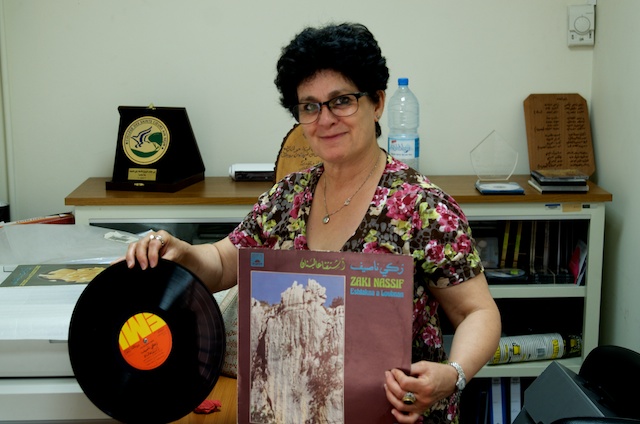 Giselle Hebbo[/caption]
“He loved beauty. Most of his songs are about beauty, especially beauty of women and love exchanges, love of nature. So I think that basically he would have loved to have married, but I think he was too busy with his creativity. He told me once that if people get married, it is a destiny, and his destiny was not to get married.”
Giselle Hebbo[/caption]
“He loved beauty. Most of his songs are about beauty, especially beauty of women and love exchanges, love of nature. So I think that basically he would have loved to have married, but I think he was too busy with his creativity. He told me once that if people get married, it is a destiny, and his destiny was not to get married.”
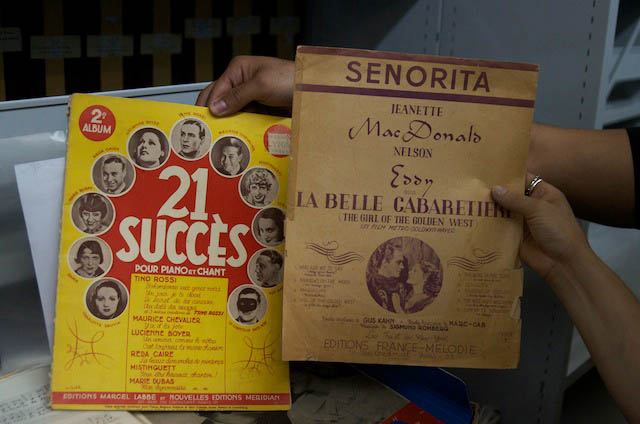 “Beirut was a cosmopolitan place. In his early twenties, Zaki used to go to the American University in Beirut for concerts and theatre performances. And that coincided in 1928/9, with some Russian immigrants who came after the Bolshevik Revolution. Many came to this part of Lebanon, including the Kouguel family. The Kouguel family founded a sort of a strange partnership between the French mandate and the American University of Beirut. In 1929, they founded the Institute of Music, the first conservatory. Its diploma was actually accredited by the French conservatory. Zaki met the Kouguel family, and registered at AUB from 1936 to 1941. But I think the Kouguel family were of Jewish origin, so in 1949 after the first war between the Arabs and Israel, they immigrated from Lebanon. And then the institute closed in 1949. A.J. Racy was the last one to graduate with a music degree.”
“Beirut was a cosmopolitan place. In his early twenties, Zaki used to go to the American University in Beirut for concerts and theatre performances. And that coincided in 1928/9, with some Russian immigrants who came after the Bolshevik Revolution. Many came to this part of Lebanon, including the Kouguel family. The Kouguel family founded a sort of a strange partnership between the French mandate and the American University of Beirut. In 1929, they founded the Institute of Music, the first conservatory. Its diploma was actually accredited by the French conservatory. Zaki met the Kouguel family, and registered at AUB from 1936 to 1941. But I think the Kouguel family were of Jewish origin, so in 1949 after the first war between the Arabs and Israel, they immigrated from Lebanon. And then the institute closed in 1949. A.J. Racy was the last one to graduate with a music degree.”
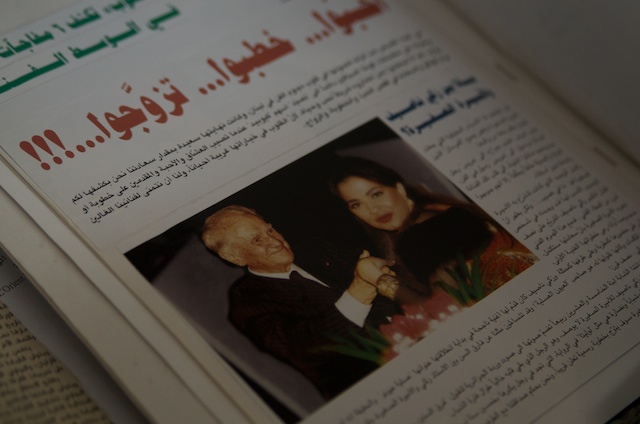 “He observed nature. He observed the villagers, for example, when there is sort of a religious feast, how they act, how they harvest. Even now, when I drive to my village, Mashghara, I can hear him singing.”
[caption id="attachment_13333" align="aligncenter" width="447"]
“He observed nature. He observed the villagers, for example, when there is sort of a religious feast, how they act, how they harvest. Even now, when I drive to my village, Mashghara, I can hear him singing.”
[caption id="attachment_13333" align="aligncenter" width="447"]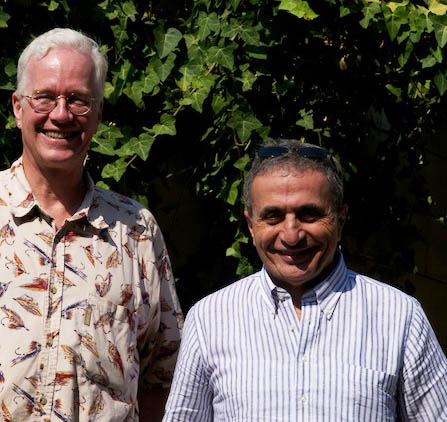 Banning Eyre, Nabil Nassif[/caption]
“He was a nationalistic person, that is, he believed in people getting their true independence, interacting with foreign superpowers, but not being under their control. Many of his songs are very patriotic. One of the last songs was about Lebanon being reconstructed after the war. And after the Qana massacres in 1996, he made one of his last nationalistic songs. It said, ‘In spite always being hurt and massacres, we will always reconstruct our country.’”
Banning Eyre, Nabil Nassif[/caption]
“He was a nationalistic person, that is, he believed in people getting their true independence, interacting with foreign superpowers, but not being under their control. Many of his songs are very patriotic. One of the last songs was about Lebanon being reconstructed after the war. And after the Qana massacres in 1996, he made one of his last nationalistic songs. It said, ‘In spite always being hurt and massacres, we will always reconstruct our country.’”
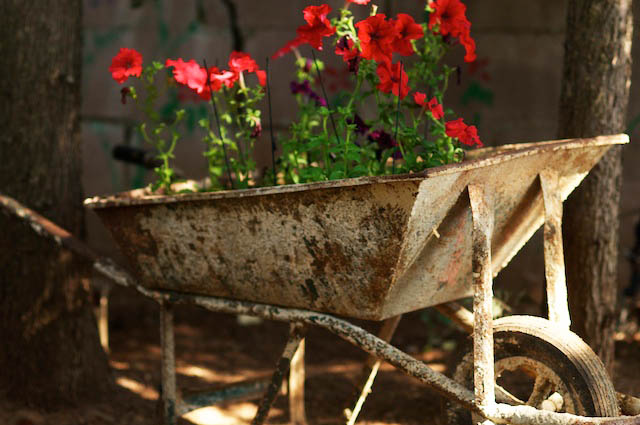
 Giselle Hebbo, Nabil Nassif, another archivist[/caption]
“Zaki Nassif, the composer, was one of six children, 2 sisters and 4 brothers, and he was the youngest. He was born in 1916 in Mashghara, located in southern Bakaa Valley close to the south region of Lebanon. At the time, the Turks controlled the country, though they were being ousted by the British and the French during the First World War. Mashghara happens to be in the Bakaa but it’s close to Mount Lebanon. The governor of Mashghara was actually in Damascus, not Beirut. But after the War, when the British and the French occupied the area, the French took the mandate over Lebanon and Syria, and the created the Republic of Lebanon, with the borders we have now, and Mashghara became part of Lebanon, not Damascus.”
[caption id="attachment_13335" align="aligncenter" width="600"]
Giselle Hebbo, Nabil Nassif, another archivist[/caption]
“Zaki Nassif, the composer, was one of six children, 2 sisters and 4 brothers, and he was the youngest. He was born in 1916 in Mashghara, located in southern Bakaa Valley close to the south region of Lebanon. At the time, the Turks controlled the country, though they were being ousted by the British and the French during the First World War. Mashghara happens to be in the Bakaa but it’s close to Mount Lebanon. The governor of Mashghara was actually in Damascus, not Beirut. But after the War, when the British and the French occupied the area, the French took the mandate over Lebanon and Syria, and the created the Republic of Lebanon, with the borders we have now, and Mashghara became part of Lebanon, not Damascus.”
[caption id="attachment_13335" align="aligncenter" width="600"] Boxes of Zaki Nassif artifacts[/caption]
“Shaki Nassif, the father of Zaki, had five brothers and they nearly all immigrated—four to the US. Two stayed in Lebanon, and all the others left. When I went to Harvard in 1970 to get my PhD there, my late father gave me the address of one of his cousins who was living in Worcester, Massachusetts, and I called him and he came and took me to Worcester, where there was a whole block of houses of people who essentially came from Mashghara. They came on ships, they used to go to Marseilles, France, and then take another ship. But they wanted to get out, because it was very hard. And this kind of sadness reflected on Zaki and his mother, and he said in some interviews that he was very much influenced by his mother’s singing. She had a very good voice, but she was singing sad songs, and she was crying, and he used to cry with her.”
[caption id="attachment_13336" align="aligncenter" width="602"]
Boxes of Zaki Nassif artifacts[/caption]
“Shaki Nassif, the father of Zaki, had five brothers and they nearly all immigrated—four to the US. Two stayed in Lebanon, and all the others left. When I went to Harvard in 1970 to get my PhD there, my late father gave me the address of one of his cousins who was living in Worcester, Massachusetts, and I called him and he came and took me to Worcester, where there was a whole block of houses of people who essentially came from Mashghara. They came on ships, they used to go to Marseilles, France, and then take another ship. But they wanted to get out, because it was very hard. And this kind of sadness reflected on Zaki and his mother, and he said in some interviews that he was very much influenced by his mother’s singing. She had a very good voice, but she was singing sad songs, and she was crying, and he used to cry with her.”
[caption id="attachment_13336" align="aligncenter" width="602"] Giselle Hebbo, Michel Moufawad in the archive[/caption]
[caption id="attachment_13332" align="aligncenter" width="601"]
Giselle Hebbo, Michel Moufawad in the archive[/caption]
[caption id="attachment_13332" align="aligncenter" width="601"] Giselle Hebbo[/caption]
“He loved beauty. Most of his songs are about beauty, especially beauty of women and love exchanges, love of nature. So I think that basically he would have loved to have married, but I think he was too busy with his creativity. He told me once that if people get married, it is a destiny, and his destiny was not to get married.”
Giselle Hebbo[/caption]
“He loved beauty. Most of his songs are about beauty, especially beauty of women and love exchanges, love of nature. So I think that basically he would have loved to have married, but I think he was too busy with his creativity. He told me once that if people get married, it is a destiny, and his destiny was not to get married.”
 “Beirut was a cosmopolitan place. In his early twenties, Zaki used to go to the American University in Beirut for concerts and theatre performances. And that coincided in 1928/9, with some Russian immigrants who came after the Bolshevik Revolution. Many came to this part of Lebanon, including the Kouguel family. The Kouguel family founded a sort of a strange partnership between the French mandate and the American University of Beirut. In 1929, they founded the Institute of Music, the first conservatory. Its diploma was actually accredited by the French conservatory. Zaki met the Kouguel family, and registered at AUB from 1936 to 1941. But I think the Kouguel family were of Jewish origin, so in 1949 after the first war between the Arabs and Israel, they immigrated from Lebanon. And then the institute closed in 1949. A.J. Racy was the last one to graduate with a music degree.”
“Beirut was a cosmopolitan place. In his early twenties, Zaki used to go to the American University in Beirut for concerts and theatre performances. And that coincided in 1928/9, with some Russian immigrants who came after the Bolshevik Revolution. Many came to this part of Lebanon, including the Kouguel family. The Kouguel family founded a sort of a strange partnership between the French mandate and the American University of Beirut. In 1929, they founded the Institute of Music, the first conservatory. Its diploma was actually accredited by the French conservatory. Zaki met the Kouguel family, and registered at AUB from 1936 to 1941. But I think the Kouguel family were of Jewish origin, so in 1949 after the first war between the Arabs and Israel, they immigrated from Lebanon. And then the institute closed in 1949. A.J. Racy was the last one to graduate with a music degree.”
 “He observed nature. He observed the villagers, for example, when there is sort of a religious feast, how they act, how they harvest. Even now, when I drive to my village, Mashghara, I can hear him singing.”
[caption id="attachment_13333" align="aligncenter" width="447"]
“He observed nature. He observed the villagers, for example, when there is sort of a religious feast, how they act, how they harvest. Even now, when I drive to my village, Mashghara, I can hear him singing.”
[caption id="attachment_13333" align="aligncenter" width="447"] Banning Eyre, Nabil Nassif[/caption]
“He was a nationalistic person, that is, he believed in people getting their true independence, interacting with foreign superpowers, but not being under their control. Many of his songs are very patriotic. One of the last songs was about Lebanon being reconstructed after the war. And after the Qana massacres in 1996, he made one of his last nationalistic songs. It said, ‘In spite always being hurt and massacres, we will always reconstruct our country.’”
Banning Eyre, Nabil Nassif[/caption]
“He was a nationalistic person, that is, he believed in people getting their true independence, interacting with foreign superpowers, but not being under their control. Many of his songs are very patriotic. One of the last songs was about Lebanon being reconstructed after the war. And after the Qana massacres in 1996, he made one of his last nationalistic songs. It said, ‘In spite always being hurt and massacres, we will always reconstruct our country.’”









